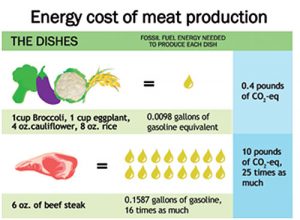
The current model for industrial meat production is not sustainable and severely damaging to the environment. At the current time about 30% of the world’s ice-free surface is used to grow crops that support industrial livestock (Time). Most of this feed is grown using mono-cropping techniques on large industrialized farms. This form of farming strips the Earth of its nutrients and depletes water supplies while simultaneously releasing large amounts of greenhouse gas. Some estimates state that approximately 18% of all man-made greenhouse gases come from industrialized farming (Time). Thankfully, there is some hope for the future. There are more sustainable ways of raising livestock which are becoming more popular among small local farms. Additionally, as the public becomes more aware of the issues that we are facing, they will hopefully be more willing to pay higher prices for sustainably produced products. If we can decrease dependency on industrial farms and increase support for smaller local farmers and ranchers, it would do a great deal to combat the serious environmental issues we are facing. In addition to this, technology has been making some incredible progress producing genetically engineered meat from stem cells which mimic the natural fibers and taste of naturally grown meat. As this technology is improved, it will become a viable meat substitute. One thing is for sure, the current methods of meat production are not sustainable for the future and something must be done.
Citation: New Study Shows the Major Environmental Impact of Meat Production | TIME.com. (n.d.). Retrieved from http://science.time.com/2013/12/16/the-triple-whopper-environmental-impact-of-global-meat-production/
Image citation: Peace, From Crisis to. “From Crisis to Peace > Chapter 3. Organic Veganism to Heal the Planet > Cool the Planet and Restore the Environment.” From Crisis to Peace – The Organic Vegan Way is the Answer. N.p., n.d. Web. 14 July 2017.
